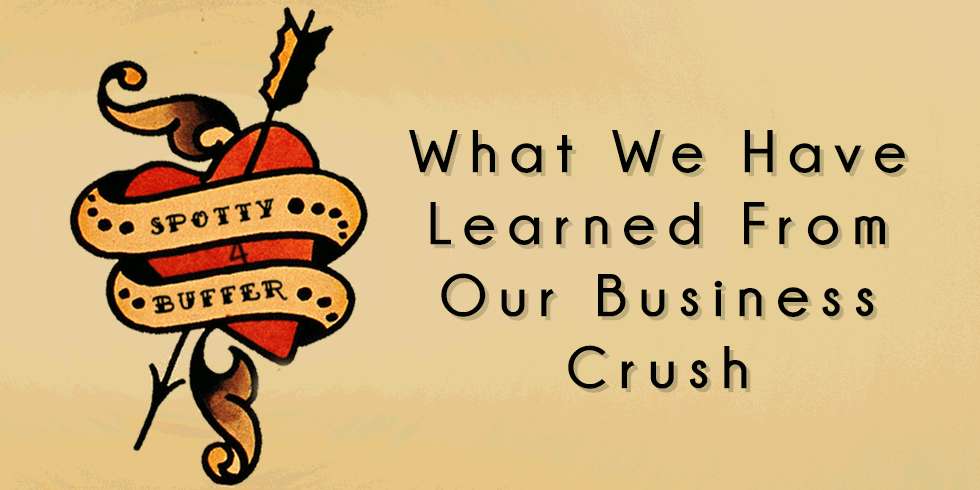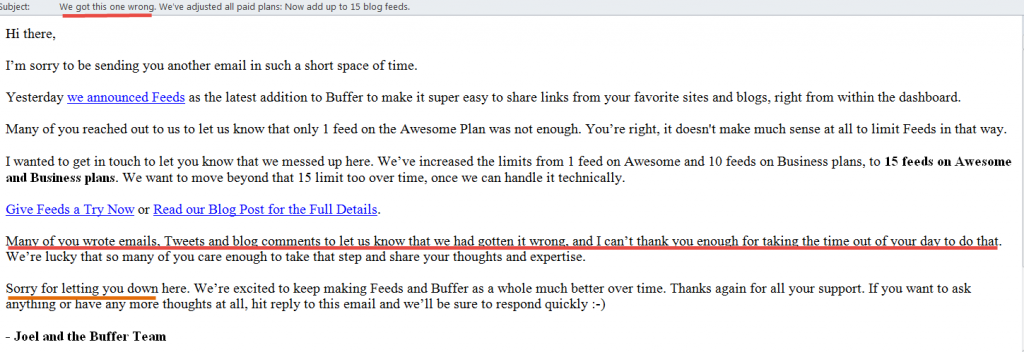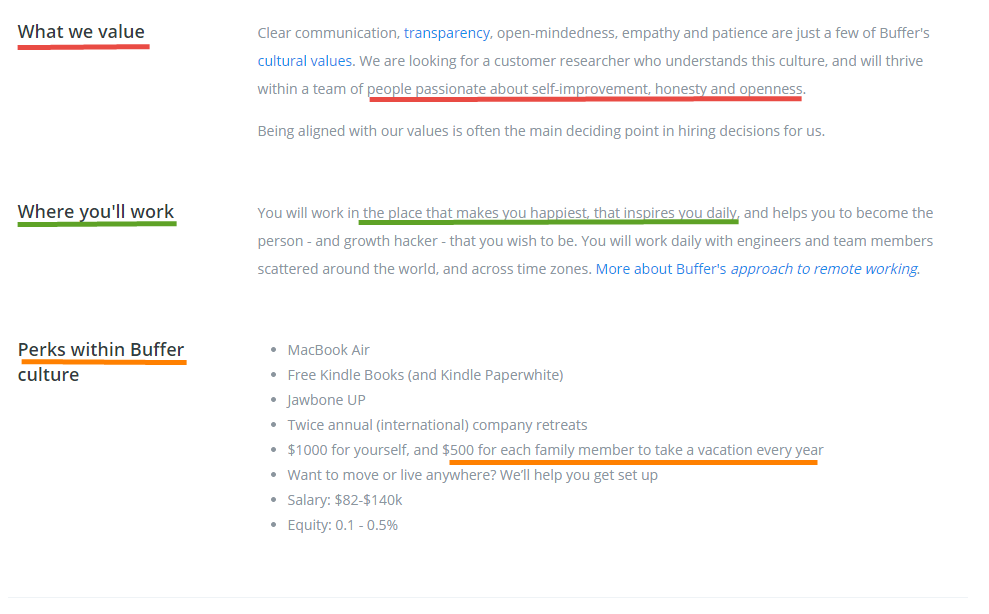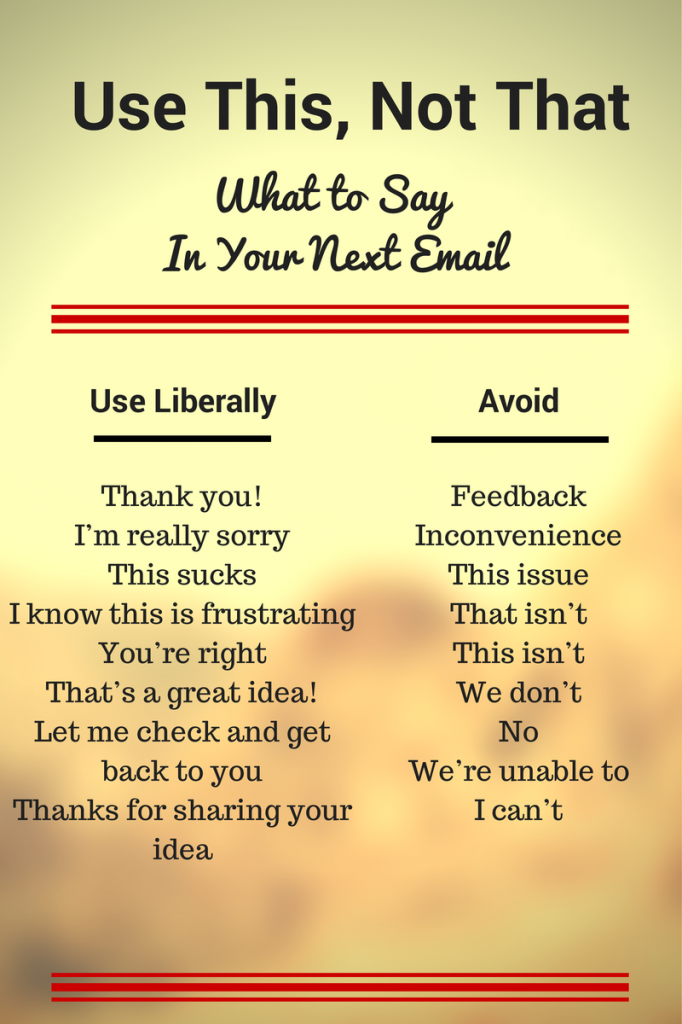Do you remember any of your teenage crushes?
My main three (I was a tad fickle) were: the boy in the year above, New Kids on the Block and even, for a brief period, the paperboy.
Even now, over two decades later, I can remember them. They leave a lasting impression and each one teaches us something.
Being a thirty-something business owner, and mum, I thought I’d left my crushing years behind me. But it turns out I now have company crushes instead.
Have you ever had a business crush? (I don’t mean the cute guy at the next desk or the lady who always smiles at you by the water cooler). I’m talking about a company that you instantly connect with, that you want to keep checking back in with to see what they’re up to, that sends you emails which make you smile…
Brand Crushes
Many people develop brand crushes.
People who not only had an iPod but got the mini & shuffle as well. Who line up for the latest release of the iPhone, while already having an iPad and MacBook Air at home.
I’m a bit of a sucker for clothing company Boden, and thus a good proportion of the entire family’s wardrobe is courtesy of Johnnie. God help the pets if they ever start doing animal Boden!
When you fall in love with a brand, you’re usually falling for a well-crafted and honed image. This isn’t an accident; brands research what makes them desirable, they test it, tweak it and use it.
It’s a bit like the early stages of dating someone, when you’re on your best behaviour and only sharing the bits you think they’ll find attractive.
This Is a ‘Genuine Business’ Crush
So who am I crushing on at the moment? Buffer
If you haven’t heard of Buffer, it’s an application that allows you to schedule your social media posts. Oh but it’s SO much more than that.
The application is incredibly intuitive and simple to use; no demo or walk through needed.
For FREE, the generous people at Buffer let you schedule up to 10 posts at a time. You can schedule to Twitter, Facebook, LinkedIn, App.net and Google+
10 posts, for a long time, were enough for me. I rarely put out more than a couple of tweets a day and like to check in regularly to make sure I’m putting out current info. They also provide analytics for your posts and have an incredibly useful ‘suggestions’ feature if you’re stuck for content.
You can upgrade to Awesome (one of the few companies that uses this word in such a genuine way that it doesn’t make my skin crawl), for around £65 a year or just over £6 a month. This gives you the ability to schedule 100 posts at a time, link to 10 social profiles and even have a team member who can help manage the account (perfect for small businesses).
But this isn’t an article on the product that Buffer supply, which is awesome and I thoroughly recommend (at pretty much every given opportunity).
Buffer is so much more than its product and this is what I want to share with you.
The thing that separates Buffer from other business crushes is that they’re not just giving you the edited highlights.
If you were on a date with Buffer, they’d be the person who rocks up and is completely themselves. They’re genuine, educated, giving, have opinions but also love to listen and are open to changing their minds.
And this is where other companies, and brands, should take note. This is where we can learn valuable lessons for our businesses and who we want to be online.
Why I’m A Fully Converted Bufferette
Buffer are by no means the only company that offer social media scheduling, they’re not the biggest and they weren’t the first.
- I’d dabbled with Hootsuite, trialled Sprout and played with Tweetdeck (back in the day) but none won me over. I loved how simple Buffer was; it did exactly what I needed it to do without any faffing around (first tick).
- I decided to tweet them to let them know that I thought they were fab, they tweeted back (second tick).
- While on Twitter I saw they had a blog. I read the blog. It was well written, relevant to my industry and current (third tick).
- I subscribed to their email list. They sent out an email about an additional feature they’d added to their awesome package, less than 24 hours later they sent another one (see below) explaining that as some people weren’t impressed with the feature they’d changed it.
Wow, a company that listens to their community and reacts – that was it, I was hooked.
Here I have to confess to going into stalker mode.
After following them on Twitter, subscribing to their blog and newsletter, I started reading old Buffer blogs and watching the ‘Buffer’s Founder Chat Friday’ youtube videos. I read about their company ethos and retreats. The more I learned about them, the more I liked what I read and the more I felt connected with them.
This is an important lesson for all businesses, if you get people hooked on your brand it’s important to give them a way to stay connected. This is why regular updates on social media, blogs and newsletters are so important.
What Sets Buffer Apart
What sets companies like Buffer apart is that they put it all out there, warts and all. This kind of openness and honesty is refreshing. It clearly helps that they have an awesome product and team to back it up. I’m sure that the company ethos is a large part of why the product has developed in such a successful way (listening to their community, rather than enforcing their vision on it) and how they’ve managed to recruit such a fab team.
It a positive catch 22, a win-win, a circle of self-perpetuating awesomeness.
Below shows part of Buffer’s hiring page for a Growth Hacker:
This is a company that’s switched its thinking. Rather than how the team can make them happy they’re thinking how they can make the team happy. Let them work from home, recruit based on skillset not location, have daily calls and check-ins, value their family life.
Keep Your Community Happy
The buffer team have a big support team, consisting of 8 Happiness Heroes, a Community Champion, a Happiness Hacker and a Chief Happiness Officer. Their focus is user happiness.
As a small business it’s not always possible to dedicate a team to this, as much as we may want to. What we can learn from Buffer is how this focus is carried through the whole team. Everyone from the CEO to the content creators take time to respond and reach out to their community.
Whether you’re a soloprenuer, or have a team of 5 or 50, you’re all responsible for how your community feel about you. One way you achieve this is the language you use when communicating with them.
In our last article we looked at defining WHO you want your company to be online and the importance of keeping that message and tone consistent. Buffer put out a great article which goes on to offer advice on how to communicate with your customers in a better way.
We Need to Talk About Kevan
I couldn’t write an article about Buffer and not mention one of their awesome content creators, Kevan Lee.
Kevan is probably the team member I feel most connected to. Partly because he pops up in my email box and twitter feed on a regular basis but largely because I LOVE the way he writes. I’m a big fan of people who research what they write, rather than tell you what they think as if it’s fact. It’s great to have opinions, it’s even more compelling if you can back them up.
And, in true Buffer style, Kevan takes the time to respond to the people who comment on his blog. As part of Buffer’s community he makes me feel valued and uplifted.
If Buffer ever have a retreat in the UK (and given previous locations include Thailand and South Africa I think it’s unlikely) I’d love to have a coffee with Kevan and discuss the wonderful world of the blogosphere!
What We Can Learn From Buffer
- Always respond (positively) to comments on blog posts, even negative ones
- Always respond (positively) to tweets directed @you
- Listen to what your community are telling you / are asking for
- Look after yourself & your employees – invest in nurturing & growing
- Switch your thinking; how can you make your team happy
- Customer happiness is everyone’s responsibility
- Give your community a way to connect with you; social media, blog posts, youtube videos, newsletters.
These are things we’ve taken from Buffer and are striving for at Spotty Octopus every day.
Do you have a business crush? We’d love to hear about it. Has how they do business taught you anything that you now apply to your business? What would you like your customers to feel when they think about your business? Please leave your comments below.








